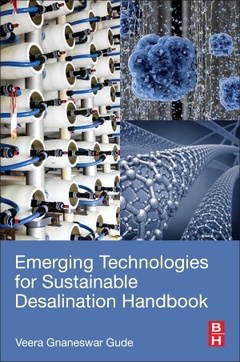Description
Emerging Technologies for Sustainable Desalination Handbook
Author: Gude Gnaneswar
Language: English
Subjects for Emerging Technologies for Sustainable Desalination Handbook:
Keywords
Adsorption desalination; Alternative agriculture; Antifouling; Aquaculture; Boron phytotoxicity; Brine; Carbon emissions; Carbon nanotubes; Climate change; Concentrate management; Desalination; Desalination energy; Draw Solution; Droplet analysis; Dust storm; Economic viability; Electrochemically active; Energy efficiency; Evaporation; Fertigation; Fertilizer; Fertilizer drawn forward osmosis; Floating agriculture; Floating farm; Food security; Forward osmosis; Gain output ratio; GOR; HDH; Heat recovery; Heat transfer; Humidification-dehumidification; Hydrophobicity; Internal heat recovery; Irrigation with seawater; Key agronomic issues; Land-sea hybrid plant species; Low-temperature desalination; Mass transfer; Membrane; Membrane desalination; Membrane distillation; Membrane fabrication; Membrane modules; Membrane properties; Membrane treatment; Multieffect distillation and MED-AD cycles; Nanocomposite; Nanomaterials; Nanostructures; Numerical modeling; Permeate; Permeate gap membrane distillation; Pervaporation; Polymer membranes; Reverse osmosis; Saline agriculture; Sandstorm; Sea agriculture; Sea farming; Seawater desalination; Shale gas wastewater; Solar desalination; Solar distillation; Solar energy; Solar still; Spray evaporator; Surface modification; Sustainable desalination; Thermal desalination; Thermodynamic; Thermodynamic modeling; Thin film composite; Transport mechanism; Waste heat; Water purification; Water reuse and water recycling; Water treatment; Zero-liquid discharge (ZLD)
558 p. · 15x22.8 cm · Paperback
Description
/li>Contents
/li>Readership
/li>Biography
/li>Comment
/li>
Emerging Technologies for Sustainable Desalination Handbook provides professionals and researchers with the latest treatment activities in the advancement of desalination technology. The book enables municipalities and private companies to custom-design sustainable desalination plants that will minimize discharge, energy costs and environmental footprint. Individual case studies are included to illustrate the benefits and drawback of each technique. Sections discuss a multitude of recently developed, advanced processes, along with notable advances made in existing technologies. These processes include adsorption, forward osmosis, humidification and dehumidification, membrane distillation, pervaporation and spray type thermal processes.
In addition, theoretical membrane materials, such as nanocomposite and carbon nanotube membranes are also explored. Other chapters cover the desalination of shale gas, produced water, forward osmosis for agriculture, desalination for crop irrigation, and seawater for sustainable agriculture. International in its coverage, the chapters of this handbook are contributed by leading authors and researchers in all relevant fields.
Environmental Engineers, Chemical Engineers, process engineering, engineers in renewable energy systems
Dr. Gude has published over 70 scientific research articles on desalination (thermal, membrane, hybrid and microbial), water- wastewater treatment and biofuels research in well-regarded journals. His research work is well utilized in the literature with over 2500 citations by 2017. He has published 3 books in desalination research (Elsevier) and 2 books in biofuels research (CRC Press), 15 invited book chapters, 50 conference proceedings papers, 15 technical reports, several popular press articles and media releases, and 2 patents in low temperature desalination and microalgae biofuels technologies respectively. He delivered 35 invited lectures including 6 plenary/keynote lectures and over 140 scientific research and educational presentations. He organized many
- Expertly explains recent advances in sustainable desalination technology, including nanocomposite membranes, carbon nanotube membranes, forward reverse osmosis and desalination by pervaporation
- Provides state-of-the-art techniques for minimizing system discharge, energy cost and environmental footprint
- Includes individual case studies to illustrate the benefits and drawbacks of each technique
- Discusses techniques for the custom-design of sustainable desalination plants for municipalities, private companies and industrial operations




